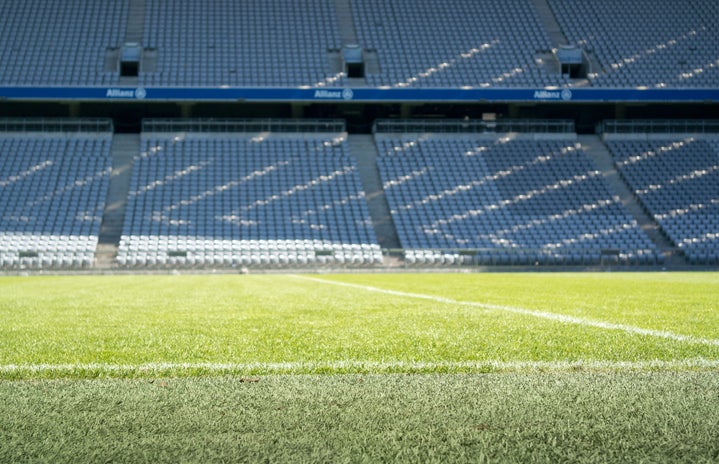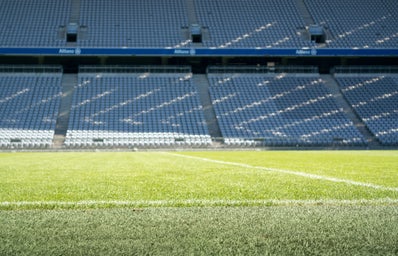By now you know that there is an ongoing investigation centering on the Notre Dame football team and academic honesty. It was announced on Friday, August 15, 2014, that Notre Dame was investigating academic fraud. Football players DaVaris Daniels, KeiVarae Russell, Ishaq Williams, and Kendall Moore have been suspended from organized team activities and Notre Dame is once again facing another scandal. Sometimes it really feels as though Notre Dame just can’t win, no matter what she does.
Arguably, we hold our athletes to higher standards than most schools: Notre Dame boasts a 96% graduation rate (1). Even more impressive, if you look at NCAA statistics, 94% of our football players graduated, compared to 75% nationally (2). We don’t just love football and love to win at football, we also strive for academic excellence. At Notre Dame, we embrace the true meaning of the word student-athlete. Our football players are not simply athletic all-stars, they are students who, at the end of the day, get the same degree as every other Notre Dame student. But sometimes, like all students, our athletes make mistakes.
As Notre Dame President Fr. John Jenkins said in his Friday press conference, “I consider this the system doing its job.
“At any university, you’re dealing with young people. The vast majority of them make good decisions, but young people sometimes make bad decisions. Our job is to hold them accountable and use those incidents as ways to educate them. That’s what we’re doing” (3).
Making poor academic choices isn’t something new at Notre Dame and it’s certainly not limited to athletes. But that does not mean that nothing good comes out poor academic decisions. Take Everett Golson, for example. He was dismissed from Notre Dame after he cheated on an exam. While away, he told Andy Staples at Sports Illustrated that when he came back, every one could expect “a more polished individual. That goes for on and off the field. I think a lot of people are more focused on me getting back on the field, but I more focused on getting back in the classroom. That’s where it happens” (4).
There’s no denying that he made mistakes and I’m going to wager that the four named players in this investigation certainly made mistakes too, but that doesn’t mean that we are not a school of incredible academic integrity. We try to give our players the entire Notre Dame experience, and I would argue we do a better job of making them students than most schools.
It is as Andy Staples said in an August 15, 2014, Sports Illustrated article: “We do know Notre Dame tries harder than a lot of schools to make the experiences of its football players more similar to the experiences of the general student body. Notre Dame lacks the Basket Weaving majors many of its fellow schools use to help keep athletes eligible to play. It seems to take academic dishonesty quite seriously – as Golson can attest. The honor code is no joke.
“ If it seems as if there are more academic honesty issues in the football program at Notre Dame, consider the possibility that Notre Dame is enforcing those issues more strictly. To put it another way, it’s easy to have a low crime rate if no one ever calls the police” (5).
As Fr. Jenkins said, this is the system working. Notre Dame is willing to sacrifice some athletic success to ensure its academic integrity. I think Staples put it best when he said, “Notre Dame answers to a higher power than the win-loss column” (6). He continues: “Notre Dame’s football program may be one of the most valuable properties in college sports, but Notre Dame’s academic reputation is far more valuable” (7).
Forget for a moment how much revenue football generates. Notre Dame doesn’t release exact numbers, but Indiana University Finance Professor Ryan Brewer estimates that the program generated about $96.6 million in revenue during the last fiscal year. He values the program at about $811.5 million, putting us second only to Texas (8).
Now remember that the endowment was worth about $8.3 billion, as of June 30, 2013 (9). Putting academics before football isn’t just a matter or virtue or honor, it’s a business decision too. No matter how much money football brings in, the money donated by those who profitted from the degrees they earned from Notre Dame depend on Notre Dame’s academic reputation, which it upholds, even at the cost of a football season or two.
But some question what it means if Notre Dame can’t uphold its academic integrity while pursuing athletic success. Rick Morrissey argued in an August 18 Chicago Sun-Times article, “The inherent tension between education and winning is no more apparent than at Notre Dame. The good people in South Bend want learning to be the most important thing at the university. That desire is one of the reasons why it’s such a good school. But those same people want a great football team, as well. It’s almost impossible to have the latter and be completely clean.” He continues, “We know this because Notre Dame has tried and can’t do it” (10).
Now I’m going to argue with Morrissey, because I don’t believe its fair to say that top-notch academics are incompatible with success on the football field simply because 5 football players in the past year have faced disciplinary actions because they made poor academic choices.
And I’m not the only one to make that argument. Fox Sport’s Stewart Mandel made the same argument on August 15: “Five wayward players on a team of 100-plus don’t necessarily represent the whole football program, much less an entire athletic department. Swarbrick emphasized Friday the “hundreds” of success stories involving other Irish athletes” (11).
Swarbrick isn’t just blowing smoke; 98% of Notre Dame athletes received degrees compared to only 88% nation wide. And of the 11 Division I men’s teams in the study at Notre Dame, nine of those teams had 100% graduation rates (12).
So when Brian Kelly said in his introductory news conference in December of 2009, “Nobody does it like Notre Dame. The excellence in academics and in the athletic arena is second to none,” he was right (13). These few players falling off the academic horse is not a fair representation of the football program as a whole.
[pagebreak]
Why can’t a school can be ranked both 18th nationally for academics and 17th nationally for football (18)? It’s unreasonable to say that you cannot be a mecca of higher learning, strong faith and athletic success, just because no one has done it before. It’s also not fair to say that Notre Dame isn’t doing it now.
We self-reported the academic fraud, no one went digging and found unclean academic records. At Notre Dame we strive for honesty and transparency, even when that may cost us victories and even when we may have to say goodbye to the most perfect season in my living memory. We don’t run away from adversity, we thrive on it.
Like Golson said while he was away, “My heart was set on going back to Notre Dame. Not necessarily to prove to anybody, just really doing it for me. It was something I started and I didn’t want to run away from it and go to a [Junior College] or go to another school, I was gonna face it” (15).
We finish what we start at Notre Dame. When we fail, we stand up again and we are always aiming for excellence. And not because we feel some need to fulfill the expectations of others, but because it is part of our identity as students.
Perhaps the best example of this is Ricky Watters. If you don’t know anything about Ricky Watters, you should know that he was a running back for the Seattle Seahawks, the Philadelphia Eagles and the San Francisco 49ers (with whom he won a Super Bowl in 1994). He was also a wide receiver on Notre Dame’s 1988 National Championship. But more importantly , he was a Notre Dame football player with unfinished business who came back to finish what he started (16).
Watters went to play in the NFL before he finished his degree. After years of incorrectly being announced as a Notre Dame graduate, he returned to South Bend to get his Notre Dame diploma. Formerly an architecture major, Watters decided he would finish a design major instead.
When asked why he wanted to return after all these years, he said, “It’s for your soul, just to feel complete and to feel like you finished it. You did what you set out to do. Both my parents, they’ve passed away now, and I know they’re looking down on me, and when they see me get that degree it’s going to be a happy time for them, too” (17).
Watters finished his remaining 9 credits this summer and he talked about how much it meant for him and for other players. But he also stressed that it needs to a priority for colleges too.
“It should be important to the university, and I love the fact that our university at Notre Dame, they care about that, they care about their guys graduating. Everyone graduates. Everyone has a chance to graduate if they want it, but you have to want it. You have to be willing to do what it takes. They’re not going to just give it to you. It’s definitely not a situation like that,” said Watters (18).
Golson found that out, just as countless other players have over the years, that there’s nothing given at Notre Dame, everything must be earned.
So perhaps there’s a lesson to be learned from one of Notre Dame’s great players. Academics and football, while they may not always seem compatible, can be if you want them both badly enough. When circumstances throw up roadblocks or temptations, there is always a way to finish what was started. Look at Watters, look at Golson. Two players, nearly 30 years apart, learned the same lesson from different life experiences. What this investigation will reveal remains to be seen, but I am confident that whatever is discovered, it will not be that an outstanding academic institution cannot win at football, rather it will be that the balance, as always, is precarious.
Victorious football teams and highly regarded academic institutions are not incompatible. Look at Stanford with their Revenge of the Nerds campaign (19.) Even if some student athletes falter in the face of academics, it does not mean the program is dirty. Rather it means, that some of our football players, like some of our non-athletes, sometimes fail to make the right choice. This is not the end of an era of Notre Dame football, nor does it spell academic ruin for Notre Dame. Instead, we have some unfinished business, which as Golson and Watters have shown us, can be finished with the right attitude and perseverance.

